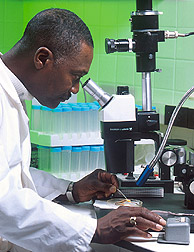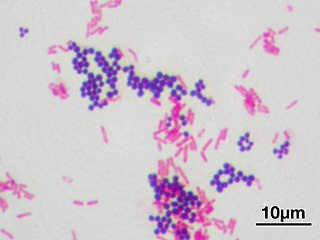
An infection is the invasion of tissues by pathogens, their multiplication, and the reaction of host tissues to the infectious agent and the toxins they produce. An infectious disease, also known as a transmissible disease or communicable disease, is an illness resulting from an infection.

The University of Nebraska Medical Center (UNMC) is a public academic health science center in Omaha, Nebraska. Founded in 1869 and chartered as a private medical college in 1881, UNMC became part of the University of Nebraska System in 1902. Rapidly expanding in the early 20th century, the university founded a hospital, dental college, pharmacy college, college of nursing, and college of medicine. It later added colleges of public health and allied health professions. One of Omaha's top employers, UNMC has an annual budget of $841.6 million for 2020 to 2021, and an economic impact of $4.8 billion.

The Infectious Diseases Society of America (IDSA) is a medical association representing physicians, scientists, and other healthcare professionals who specialize in infectious diseases. It was founded in 1963 and is based in Arlington, Virginia. As of 2018, IDSA had more than 11,000 members from across the United States and nearly 100 other countries on six different continents. IDSA's purpose is to improve the health of individuals, communities, and society by promoting excellence in patient care, education, research, public health, and prevention relating to infectious diseases. It is a 501(c)(6) organization.

Medical microbiology, the large subset of microbiology that is applied to medicine, is a branch of medical science concerned with the prevention, diagnosis and treatment of infectious diseases. In addition, this field of science studies various clinical applications of microbes for the improvement of health. There are four kinds of microorganisms that cause infectious disease: bacteria, fungi, parasites and viruses, and one type of infectious protein called prion.

Joia Stapleton Mukherjee is an associate professor with the Division of Global Health Equity at the Brigham and Women's Hospital and the Department of Global Health and Social Medicine at Harvard Medical School. Since 2000, she has served as the Chief Medical Officer of Partners In Health, an international medical non-profit founded by Paul Farmer, Ophelia Dahl, and Jim Kim. She trained in Infectious Disease, Internal Medicine, and Pediatrics at the Massachusetts General Hospital and has an MPH from Harvard School of Public Health. Dr. Mukherjee has been involved in health care access and human rights issues since 1989, and she consults for the World Health Organization on the treatment of HIV and MDR-TB in developing countries. Her scholarly work focuses on the human rights aspect of HIV treatment and on the implementation of complex health interventions in resource-poor settings.
Jonathan James Juliano is an American physician/scientist. He currently works at UNC School of Medicine.

Infectious diseases or ID, also known as infectiology, is a medical specialty dealing with the diagnosis and treatment of infections. An infectious diseases specialist's practice consists of managing nosocomial (healthcare-acquired) infections or community-acquired infections. An ID specialist investigates the cause of a disease to determine what kind of Bacteria, viruses, parasites, or fungi the disease is caused by. Once the pathogen is known, an ID specialist can then run various tests to determine the best antimicrobial drug to kill the pathogen and treat the disease. While infectious diseases have always been around, the infectious disease specialty did not exist until the late 1900s after scientists and physicians in the 19th century paved the way with research on the sources of infectious disease and the development of vaccines.
Antimicrobial stewardship is the systematic effort to educate and persuade prescribers of antimicrobials to follow evidence-based prescribing, in order to stem antimicrobial overuse, and thus antimicrobial resistance. AMS has been an organized effort of specialists in infectious diseases, both in Internal Medicine and Pediatrics with their respective peer-organizations, hospital pharmacists, the public health community and their professional organizations since the late 1990s. It has first been implemented in hospitals. In the U.S., within the context of physicians' prescribing freedom, AMS had largely been voluntary self-regulation in the form of policies and appeals to adhere to a prescribing self-discipline until 2017, when the Joint Commission prescribed that hospitals should have an Antimicrobial Stewardship team, which was expanded to the outpatient setting in 2020.
The European Society of Clinical Microbiology and Infectious Diseases (ESCMID) is a non-profit scientific international organization with headquarters in Basel, Switzerland. Its mission is to improve the diagnosis, treatment and prevention of infection-related diseases by promoting and supporting research, education, training, and good medical practice. An important activity of the society is the organization of the annual scientific congress ECCMID. This is recognized as the largest international forum for disseminating research in the fields of medical microbiology and infectious diseases for experts in academia, clinical settings and industry. The congress began as a biennial event, with about 1,500 participants at its inaugural occurrence in 1983. It became an annual event in the year 2000, and it has grown since then, now attracting around 14,000 participants annually. More than 5,000 scientific abstracts are submitted for inclusion each year by researchers from multiple countries. The most recent ECCMID was held in April 2023 in a hybrid format, both online and onsite in Copenhagen, Denmark.
The Society of Infectious Diseases Pharmacists (SIDP) is a non-profit association of pharmacists and other allied health professionals who specialize in infectious diseases and antimicrobial stewardship. According to the Board of Pharmaceutical Specialties, clinical pharmacists specializing in infectious diseases are trained in the use of microbiology and pharmacology to develop, implement, and monitor drug regimens that incorporate the pharmacodynamics and pharmacokinetics of antimicrobials for patients.
Yvonne "Bonnie" Maldonado is an American physician, pediatrician, and Professor of Pediatrics and of Health Research and Policy at Stanford University, with a focus on Infectious Diseases. She founded Stanford's pediatric HIV Clinic and now serves as Stanford University School of Medicine's Senior Associate Dean of Faculty Development and Diversity.
Alison Helen Holmes is a British infectious diseases specialist, who is a professor at Imperial College London and the University of Liverpool. Holmes serves as Director of the National Institute for Health Research (NIHR) Health Protection Research Unit in Healthcare Associated Infections and Antimicrobial Resistance and Consultant at Hammersmith Hospital. Holmes is on the Executive Committee of the International Society of Infectious Diseases, and she serves on a variety of World Health Organization (WHO) expert groups related to antimicrobial use, Antimicrobial Resistance (AMR), infection prevention and sepsis. Her research considers how to mitigate antimicrobial resistance.
Valerie Ellen Stone is an American physician who is a professor of medicine at the Harvard Medical School. She serves as Vice Chair for Diversity, Equity, and Inclusion, Department of Medicine, Brigham and Women's Hospital. She specializes in the management of HIV/AIDS, health disparities and improving the quality of medical education.
Sheritta A. Strong is an American adult psychiatrist and an assistant professor in the Department of Psychiatry at the University of Nebraska Medical Center. Strong is a leader in education and advocacy at UNMC, and is the co-director of Medical Student Education in the Department of Psychiatry as well as the Interim Director for Inclusion at UNMC. As a psychiatrist, Strong focuses her clinical attention on treating patients with chronic and persistent mental illness. She is also dedicated to reducing barriers to healthcare access for marginalized populations and she mentors underrepresented scientists and physicians to increase their retention in healthcare. In 2018, Strong was awarded the Nancy C.A. Roeske, M.D., Certificate of Recognition for Excellence in Medical Student Education by the American Psychiatric Association (APA) and in 2020 Strong became a Distinguished Fellow of the APA.
Susan Swindells is an American AIDS researcher.

Jameela Al Salman is a Bahraini physician, infectious disease specialist, and associate professor at the Arabian Gulf University. She has won several awards and honors for her contributions to the field of medicine. Al Salman holds three American Board certifications: the American Board of Internal Medicine, the American Board of Geriatric Medicine, and the American Board of Infectious Diseases.
Edward Harold Kass was an American physician, medical school professor, medical researcher in infectious diseases, medical journal editor, and historian of medicine. He is known for his research on toxic shock syndrome and urinary tract infections.
Herbert "Bert" Lancashire DuPont is an American physician, medical school professor, and medical researcher, specializing in infectious diseases.
Dr. Matifadza (Mati) Hlatshwayo Davis is a Zimbabwean born, American based physician and public health expert in Missouri. Her subspecialty is infectious diseases, with a focus on community engagement addressing health disparities amongst people from historically marginalized groups. She serves as the Director of Health for the City of St. Louis Department of Health.
Janet Gilsdorf is an American pediatric infectious diseases physician, scientist, and writer at the University of Michigan. Her research has focused on the pathogenic, molecular, and epidemiologic features of the bacterium Haemophilus influenzae. She served as the Director of the Division of Pediatric Infectious Diseases in the University of Michigan Health System from 1989 to 2012 and Co-Director of the Center for Molecular and Clinical Epidemiology of Infectious Diseases at the School of Public Health at the University of Michigan from 2000 – 2015. In addition to her scientific publications, she is also the author of two novels, one memoir, one non-fiction book, and a number of medically-oriented essays.







